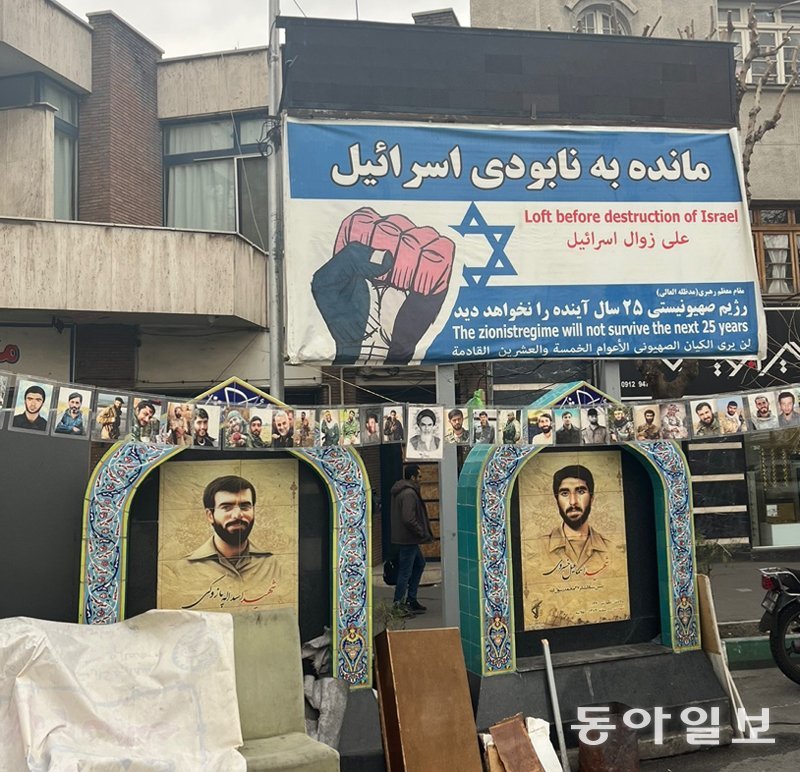The hard-line conservatives in power focus on ‘anti-Americanism and anti-Japanese sentiments’
Citizens: “We support other countries’ wars even though the economy is struggling”
Young people also call for “reconciliation with Israel”
“Iran will never get closer to the United States.”
This is a phrase written in Persian under the exterior wall of a building in downtown Tehran, the capital of Iran, on the 1st. On this wall were drawings of missile shells and skulls falling on an American flag. There was also an article in English that said, ‘Down with USA.’
The hard-line conservatives who came to power after overthrowing the pro-American monarchy in the 1979 Islamic Revolution continued to demonize the United States to strengthen the legitimacy of their power. After suspicions of Iran’s nuclear development arose in 2002, Western economic sanctions continued. Meanwhile, in 2018, the U.S. Donald Trump administration unilaterally abrogated the nuclear agreement signed between Iran and five Western countries during the U.S. Barack Obama administration and imposed severe sanctions on Iranian oil, worsening economic difficulties. As a result, anti-American public opinion among the Iranian people reached its peak. It was a picture that clearly showed that this trend is still maintained today.
 There were also memorial sites throughout Tehran commemorating members of Hezbollah, a Lebanese Shia armed group, who died while engaging in direct combat with Iran. Tehran =
There were also memorial sites throughout Tehran commemorating members of Hezbollah, a Lebanese Shia armed group, who died while engaging in direct combat with Iran. Tehran = It was easy to see posters criticizing not only the United States but also Israel, America’s closest ally in the Middle East, throughout Tehran. In places with a lot of floating population, such as mosques, intersections, museums, and parks, there was always a space to commemorate the fallen of Hezbollah, a Lebanese Shiite armed group that is actually engaged in direct combat with Israel on behalf of Iran.
Mr. Mohammed, a citizen I met near a mosque, said, “Israel is Iran’s main enemy. He said, “The Hezbollah members who died fighting against Israel were martyrs,” and “I came to commemorate the martyrs.”
However, most citizens expressed strong dissatisfaction with the government’s unilateral support of Hezbollah, Hamas, the Palestinian armed group that attacked Israel in October last year, and Houthis, Yemen’s Shia rebels. This means that the domestic economic crisis is severe, so why pour money outside the country? Another citizen, Daniel (52), said, “I don’t like Israel, but Iranians love peace. “I cannot support a government that only supports other countries’ wars when the people are having a hard time making a living,” he said.
Mr. Kader (49), who trades with China, confirmed that the reporter was Korean and said, “Due to sanctions, we cannot directly import good electronic products from Samsung and LG. “Even if it is imported secretly, it is sold at extremely high prices on the black market,” he criticized, adding, “The people are suffering unnecessary harm due to the government’s hardline diplomacy.”
In September 2022, some young people who were opposed to the government due to the ‘hijab mysterious death’ also called for reconciliation with Israel. A college student I met at the traditional market in Tajiri City, outside Tehran, requested anonymity and said, “The enemy of the Iranian people is our government. But isn’t the enemy (Israel) of the enemy (government) actually a friend? “So the Iranian people and the Israeli people can get along well.” He said, “Before the Islamic Revolution, many Jews lived in Iran. “We were all friends at the time,” he emphasized.
Tehran =
Source: Donga
Mark Jones is a world traveler and journalist for News Rebeat. With a curious mind and a love of adventure, Mark brings a unique perspective to the latest global events and provides in-depth and thought-provoking coverage of the world at large.